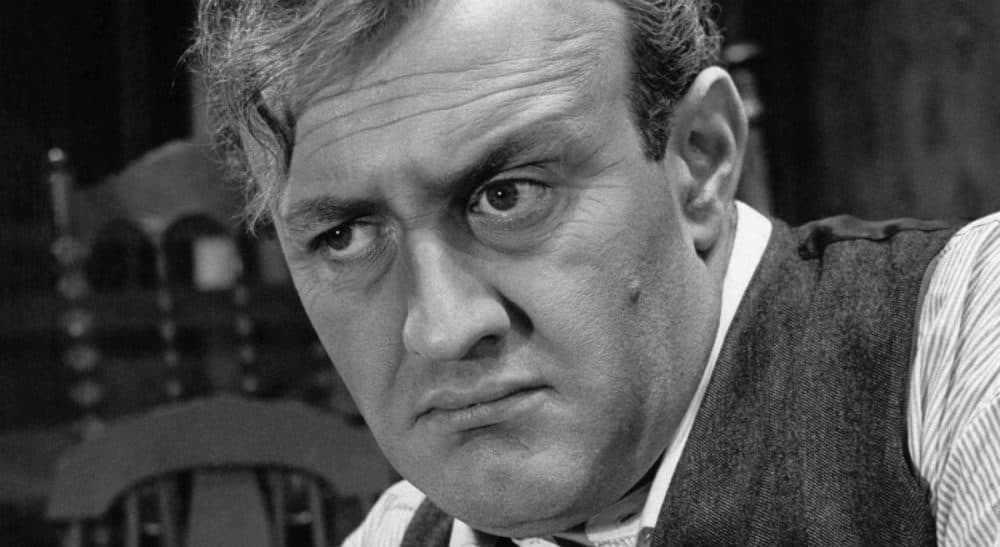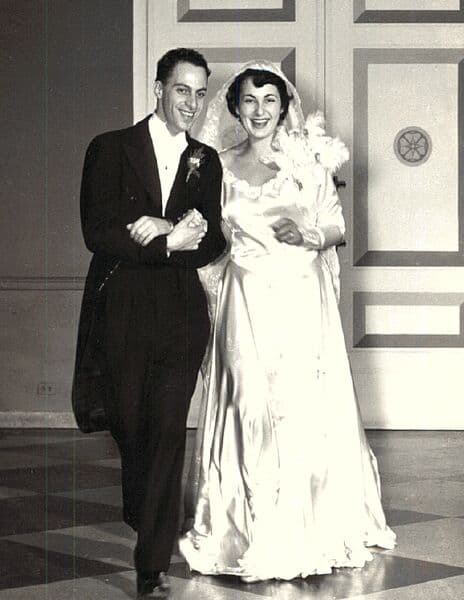Advertisement
Attention Must be Paid: How 'Death Of A Salesman' Changed A Life

The centenary of playwright Arthur Miller’s birth last month evoked for me memories of my late father. The two men never met, but Miller’s extraordinary play, "Death of a Salesman," ultimately helped to change the course of my father’s life.
Lee J. Cobb played the protagonist, Willy Loman, in the play’s 1949 premier, which my parents saw on their honeymoon in New York. In his wrinkled shirt, with his rumbling voice and a single dismissive wave of his hand, Cobb seared that character into my father’s mind. And rereading the play, I appreciate why.
“The only thing you got in this world is what you can sell,” Willy’s neighbor Charlie tells him. “And the funny thing is that you’re a salesman, and you don’t know that.”
'Why am I trying to become what I don’t want to be?' Biff demands of Willy late in the play, trying to once and for all break free of his father’s expectations and be his own man.
A salesman at the time, trying to get local grocers to make room in their freezers for a strange new product — frozen dinners — my father didn’t know that either. Or at least he didn’t want to believe it. Chicken Chow Mein and Sara Lee Brownies were no more nutritious for the soul than they were for the body, and it was Biff, Willy’s lost and drifting son, in whom my father saw himself.
“Why am I trying to become what I don’t want to be?” Biff demands of Willy late in the play, trying to once and for all break free of his father’s expectations and be his own man. “What am I doing in an office, making a contemptible, begging fool of myself, when all I want is out there, waiting for me the minute I say I know who I am!”
Like so many first-generation American (and Canadian) men, my father, born in 1926, scrambled to balance between the demands of the old world, embodied in their fathers, and the opportunities of the new world. His father, like Arthur Miller’s father, had been a wealthy women’s clothing manufacturer until the crash of 1929.
“During the Depression my dad lost everything, and he was determined that we would have a trade, some way to support ourselves even in hard times,” my father told my brother and me, trying to make sense of his own life, explaining how he’d ended up with a chemical engineering degree and a job in a paint factory at the age of 22.
“And you listened?”
“I listened.” He smiled sadly. “In those days, we listened.”
“And yet … “

“And yet when I was in the Sherwin-Williams factory, doling out the pigment into the base, I felt the moments of my life swirling away.” He left that job quickly, and embarked on a string of failed attempts to make a living and be his own boss as a salesman. Newly married, sitting in that Broadway theatre in 1949, he’d seen a preview of his own life.
“Willy Loman never made a lot of money,” scolds Willy’s wife Linda in "Death of a Salesman," taking their son to task for disrespecting his father. “His name was never in the paper. He’s not the finest character that ever lived. But he’s a human being, and a terrible thing is happening to him. So attention must be paid.”
That anguished demand, phrased in its curiously impersonal passive voice, haunted my father. It’s what confirmed for him that he could help and honor others by actively listening to their stories.
“You can’t eat the orange and throw the peel away,” a stunned Willy Loman tells the young man who has just fired him. “A man is not a piece of fruit!”
Cobb delivered those lines with utter disbelief, as if explaining to an imbecile that yes, a batter gets three strikes in baseball, not two. A man has pride. A man has stature. A man should not be diminished. But Cobb’s voice shrunk with each passing moment in the scene. His chest caved in on itself, as though he had literally had the stuffing knocked out of him.
The actor was tall, and when you see film of him in the scene at home later that evening — shirt collar and cuffs unbuttoned, sleeves rolled up, shoulders sagging in his limp grey vest — you see tragedy embodied in a hollowed-out man. Recognizing his own diminishment, he deflects, predicting doom for his once-beautiful Biff, the wayward son who is trying finally to embrace his own aspirations instead of his father’s fantasy.
“I wanted my life to have meaning,” my father told my brother and me.
And so like Biff returning to the open sky of the West, my father changed course ... he walked away from the life he was supposed to have ... and into the one he needed ...
And so like Biff returning to the open sky of the West, my father changed course. After his string of businesses selling frozen foods and dish detergent fainted from the lack of an oxygen he couldn’t breathe into them, after his own father died, he walked away from the life he was supposed to have as a prosperous businessman and into the one he needed, as a modest and beloved psychotherapist. His was a different dream of success, one in which being a good father and making a difference in the world mattered most.
Today, that dream is increasingly the norm. Thanks to the values imbued by their parents and the brutal education provided by the most recent recession, most of the young men I know place prosperity lower on their list of aspirations, well below strong relationships with friends and family, and the desire, if not to improve the world, to at least do no harm.
But in my father’s day, it was art — a single play infused with passion and vision — that fueled this kind of transformation.
In his poem "Asphodel" William Carlos Williams wrote, It is difficult/to get the news from poems/yet men die miserably every day/for lack/of what is found there.
Arthur Miller and my father proved him right.
